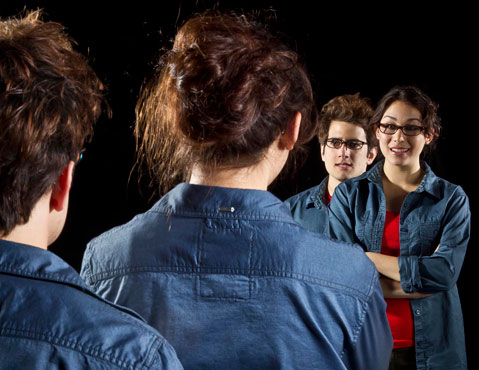Entangled Opens at UCSB
Hatlen Theater Hosts Play About Physics, Ballet, and the Emotional Life of Twins

Estranged twins — one a physicist, the other a ballerina, with both parts played by one actress — are reunited as members of the faculty at Twins Academy, a unique boarding school exclusively for twins. This quirky theatrical idea forms the nucleus of Lila Rose Kaplan’s Entangled, a new play that gets its premiere this weekend as part of director Risa Brainin’s Launch Pad series. Also premiering with this show is UCSB’s newly remodeled Hatlen Theater, which got its high-tech makeover thanks to the generosity of longtime department supporters Jon and Lillian Lovelace.
The combination of Kaplan’s sophisticated comedy of ideas and the Hatlen’s new lighting, electronics, sound system, and interior promises to dazzle. Entangled, which was developed in part as a result of Kaplan’s experience as a writer in residence at UCSB’s Kavli Institute for Theoretical Physics (KITP), heralds a new era for the flourishing UCSB theater BFA program, which finally has the state-of-the-art large proscenium facility it deserves. It also signals great things for the interdisciplinary initiatives between the sciences and the humanities at UCSB, which have a shot at glory with Kaplan, who is a rising star of the New York Off-Broadway scene.
I spoke with Brainin and Kaplan about the show last week at the new Hatlen Theater.
Risa, could you start by talking a bit about Launch Pad?
RB: I got the idea that once a year I would bring in a professional playwright to do a new play in process with student actors, and that was what became Launch Pad. Once it was up and running and the shows that started here began to see some after-success, I was given a sabbatical during which I traveled to meet new playwrights and to see plays. Lila also happened to be coming here, we knew each other through Naomi Iizuka, who was a professor here at UCSB and is now teaching in San Diego, and I knew that her writing would be strong, so I invited her to make a play with us this year.
How much does the show change when you are doing a development process like this? For example, do you know going in whether it will be one act or two?
RB: That’s actually a very good example because we started [this play] with no intermission, and then for a while it had one, and now it doesn’t again. So, I guess the answer is a lot. The show changes a lot.
And did I hear someone say there’s music?
RB: Yes, there’s music by Brad Carroll, the composer of Lend Me a Tenor.
Lila, when did you realize that you would write this particular show?
LK: My ideas often begin as collages. I was writer in residence at the KITP, and I became intrigued by this theory of entanglement in quantum physics — the idea that two particles can become correlated to predictably interact with each other, regardless of how far apart they were. But I didn’t want to do something didactic. The idea was not to teach people physics in a theater, but to present this idea in a theatrical way, and to communicate what it might be like to experience entanglement occurring between two people.
I know you also spent time researching twins. What did you learn about twins by writing this show?
LK: I learned that they deal with a lot of expectations that are based on myths and misperception. I also learned that every pair of twins has to figure out how to be single and how to be a part of the pair.
What’s the tone and style of the piece?
LK: In tone, it’s very funny, and it’s dark. As for the style, one of the twins is a ballet dancer, and I did dance for a while, so when it comes to that, I’m more interested in bodies in space than I am in a lot of props on my sets.
4•1•1
Entangled opens on Saturday, March 3, at 8 p.m. and runs Sunday, Match 4, at 2 p.m. and Thursday-Saturday, March 8-10, at 8 p.m. For tickets and information, call 893-3022 or visit www.theaterdance.ucsb.edu.



